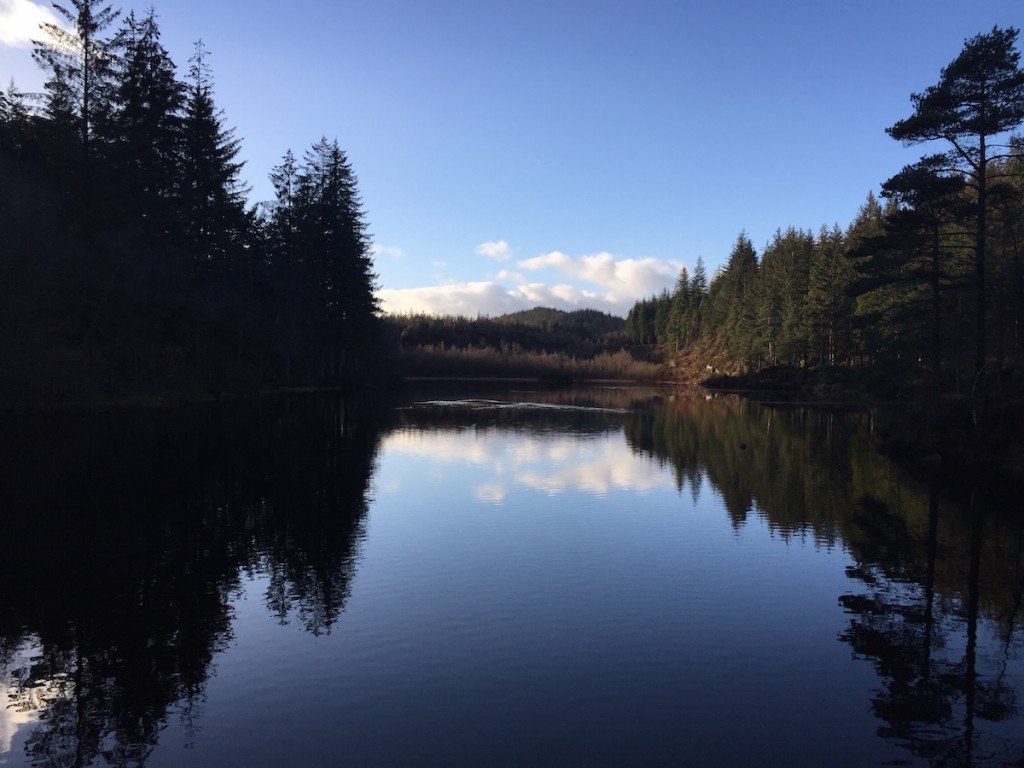Some interesting edu reading links here. I think the podcasting one is missing a trick by mentioning 1:1 podcasting, IMO, is a wonderful opportunity for collaborative learning. You can do a lot with one computer and a bit of classroom organisation.
Tag: Uncategorized
Starting to think about Owning your own data http://myword.io/?url=https://dl.dropboxusercontent.com/u/81715/ownyrownjson.json
Starting to think about Owning your own data http:/
10 Years Blogging
Ten years ago today I made my first post on this blog. 882 post (plus this one) for a total of over a quarter of a million words. I’d posted to blogs before this one, but this one stuck.
You would think, by this time, I’d have some sort of plan going, but no, this blog continues to be pretty haphazard without a real sense of audience or single purpose.
It does provide me with a thinking tool and scrapbook which I continue to enjoy and that is still enough for me.
The blog has been the starting point for all sort of online and offline experiences. I’ve dallied with other online spaces and playgrounds, but keep coming back here.
The blog itself has moved and changes: starting as a sub weblog of my school/class site using pivot; it moved to this domain and got a change of name when I left school; got upgraded to pivotx; and then moved to WordPress. I still think of it as the same place.
Along the way, I’ve broken links, lost images and comments, but still have a reasonable portfolio of my ramblings and technological roaming.
The image with this post is to remind me to try and reflect rather than ramble;-)
Glow Blogs WordPress 4

Yesterday at 4 O’Clock the glow blogs system was upgraded to WordPress 4. The site was down for around 4 minutes.
Glow blog are now running on WordPress 4, not much a a big deal as most other WordPress blogging site are doing the same. But we just upgraded >140000 blog for WordPress 2.9.2 to WordPress 4.0.1 a pretty amazing effort. Setting up from scratch would be simple enough, looking after all of the foibles of a creaky system a bit more complex.
It has been a pleasure working with the Blogs Team for this release, including:
Sonali Nakhate Project Manager; Turnbull and John MacLeod from the technical team at Scottish Government; Grant Hutton and David Orr of the test department at Scottish Government and Code For The People, now part of Automattic who managed to get aquihired by the company behind WordPress.com during the project!
We also got a ton of support in all sorts of ways from the extended glow team at the Scottish Government and Education Scotland and from many in the wider Scottish Education community.
A First Step
Although this is the second phase of the blogs project it is really just the precursor to the next phase. We are starting to discuss the plans for phase three now. This is, I hope, the really exciting bit…
The Glow Help Blog is being updated and I am listing some of the main changes here: Blogs Update Phase 2 WordPress 4 – Glow Blog Help.
Friendly Monsters
Some recent links from my Pinboard. Mostly related to open resources.
- The Crusade for Curious Images | OpenGLAM
n December last year the British Library released over a million images on to Flickr Commons. …
… The Curious Images event held yesterday offered a whirlwind tour of the reuse of the images by artists, researchers and other institutions and of the challenges that tracking use and finding appropriate images continue to pose. - A fellow DS106 participant, Ron Leunissen from the Netherlands was among the winners GIF IT UP winners | OpenGLAM
GIF IT UP was an open competition to find the most excellent GIFs reusing openly licensed images and video from the collections searchable on the sites of the two digital libraries.
I think there is real potential for teaching about open licensing, copyright while having some fun and learning a bit about image editing through the creative use of openly licensed media.
- Monsters Are Real – Biodiversity Heritage Library a nice collection of open licence images. The Biodiversity Heritage Library works collaboratively to make biodiversity literature openly available to the world as part of a global biodiversity community.
- Lots more of this sort of thing at the OpenContentToolkit provide a gateway to contemporary and historical open digital media content from media archives and collections around the world. It is a space to explore, discuss and share examples of the use of open media at all school stages and at all levels of education.
- Not a open resource but
Lego Friends made me laugh and makes a point.
#glowblogs improvements: text handling

Since WordPress 3.9 the TinyMCE editor now automatically cleans out all but the semantic HTML from Word (or Rich text copied from elsewhere), meaning any fonts, styles, etc. You preserve headings, blockquotes, lists, links, bold, italic.
From: Peek in the SPLOT: TRU Writer
This means WordPress handles text pasted from word a lot better that the current WordPress 2.9.2 does
Even though, like Alan, I don't think writing everything in word is a great idea lots of folks do exactly that. This then should be useful for #glowblogs after the upgrade.
I'll be posting a few things here about the changes in glow blogs coming in January over the next few weeks.
Dark corners of the Internet

republica 2013 099 #rp13 by Blogging Dagger Attribution-ShareAlike License
How do we redirect seemingly inane goals of “connecting” beyond upping friend, follower, and subscriber counts towards notions of community and care and concern for each other, especially in places and conversations that are fraught with anger, frustration, and deep, deep potential for harm?
from: What We Don’t Talk about When We Talk about Connectedness by Bud The Teacher
Great Question, greatarticle gives no glib answer except some more good questions. I am sure I can’t answer it either but I don’t think the answer is to turn if off or ignore it. Children face danger in real life too, I wonder if we can learn from that?
Education Modern Learners is behind a membership wall, some articles like this one can be read with my free membership.
What is Openness?
Over on week 1 of P2PU Why Open? course the question is:
What do you think “openness” is? Focusing on your own field or context (if you wish), describe what it means to do work openly, or to make one’s activity or artifacts open. Alternatively, you could talk about what you think “openness” means generally, what sort of definition might fit all open activities or works.
What follows are some rather scrappy notes on my first reactions to the question. I’ve blogged a bit about openness before too.
Blogging in the Open
My own field is education, I am a primary teacher now involved in staff development and ict support. To work openly means to me several things:
- To be able to publish my thoughts and idea without permission (limited by social norms, employment and the law).
- To put things in my own space not to be tied down to a silo or format.
- To be able to sink or swim in the internet ocean, the majority of my posts here sink, a few tweets and then down to the Davy Jones locker of archived posts. But that allows me to write what I like, no one is paying for it.
- For pupils as well as teachers and everyone else there can be amazing connections made by being out in the open online. Here is a video I made for Alan Levine’s True Stories of Open Sharing to give examples of the benefits of working in the open, where I describe one example of goodness that came to my class of 10 year olds by working in the open.
Apologies for the quality of the video, made in too much of a hurry.
Playing in the Open
To play openly is just as important to me, I learn about my field of interest in education, the digital, by playing. Playing in the open give me the same gains as listed above but emphasises:
- The ability to play freely with others, sharing ideas, copying, riffing and remixing.
- Talking across domains, I am learning/playing with psychologists, artists, teachers without worrying too much about labels. Being in the open leads to serendipitous connections that would not be made if we kept our activity or artefacts in walled gardens, or our own hard drives.
I’ve a rather long post lurking in my mind about the learning I’ve being doing around GIF FIGHT!!. On the surface a rather silly game of creating gifs played among people who should know better. It turns out I’ve learned more about manipulating graphics than in numerous unfinished tutorials. In addition I’ve learned a lot about learning through play, interacting online and how I learn myself.
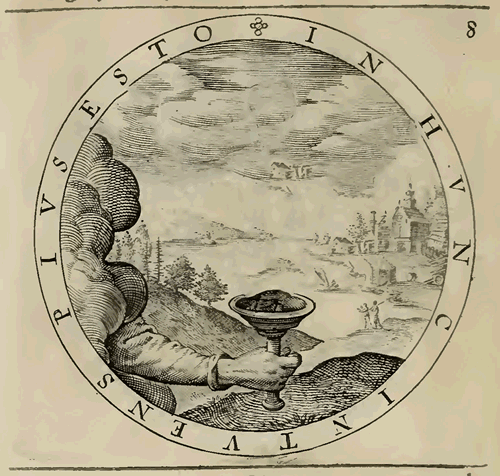
More Seriously
Open education can promote knowledge transfer while at the same time enhancing quality and sustainability, supporting social inclusion, and creating a culture of inter-institutional collaboration and sharing. In addition, open education can expand access to education, widen participation, create new opportunities for the next generation of teachers and learners and prepare them to become fully engaged digital citizens.
from: Scottish Open Education Declaration seems about right to me.
Recently I’ve been challenged a bit about the idea of open being the preferred mode of working online, I am hoping that if I stick to the Why Open? course I’ll be able t ogive less anecdotal answers.
Blog Migration Notes: Users
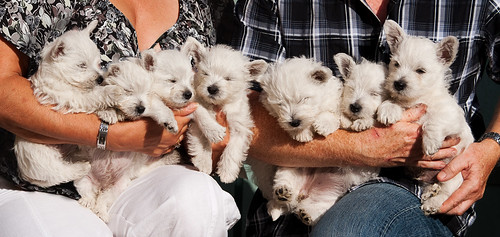
The Whole Gang, 50 Days old by Dean Searle Attribution-NonCommercial-NoDerivs License
There is some background to this project in a previous post: Glow Blogs Summer 2014.
Before the migration of the glow portal Education Scotland suggested that schools did some pruning and tidying of their glow groups to make migration easier (less data) and so that users had less to sort through and sort out on the other end.
As the date for migration of blog gets nearer a few folk have been asking me about what is going happen to their blogs, if there is anything that they should be doing and what will change. This post will try and address some of the questions.
You should not need to do any pruning and tidying of your blogs. The intention is to migrate everything as is to the new system. I was always surprised to be asked about tidying up and deleting old posts from school and class blogs. for me a blog is for life, it is a positive that I could dive back into the archive and see some of what I was doing years ago.
The blog only knows about users that have visited already
One of the biggest changes will be the decoupling of the blogs from the old glow groups. In the current, old, system the users and permissions of those users are set inside the glow group that the blog was created in. Those groups will go away. After migration you blog will not be able to refer to the old sharepoint group to find out who has permission do do things (view, post, carry out admin tasks) the only users it will know about are ones who have already visited the blog when logged into glow.
For example:
- Teacher A has set up a blog in the old glow for herself and 2 colleagues, Teacher B and Teacher C (not their real names) to share links about their subject with pupils.
- Teacher A is the blog admin and The other two are contributors.
- The blog is a public blog so anyone in the world can view it.
- Teacher B has already added a couple of links by creating posts on the blog.
- Teacher C has yet to log on to the blog.
- After the switch over to the new authentication system and the blog migration Teacher A and B can log on, Teacher A is still an admin and Teacher B can log on and create posts.
- When Teacher C tries to log on there is no entry in the WordPress database for him as having a role in this blog. If he has never used any glow blog he will not be in the database at all. Teacher C will not be able to log on or create posts.
- At that point Teacher A will be able to log on to the dashboard, go to the users screen and add Teacher C as a contributor.
To avoid this scenario Teacher C would need to log on to the blog before the migration.
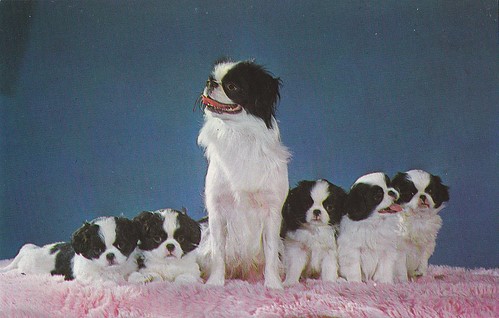
Japenese Spaniel by Muzik Hounds Attribution-NonCommercial License
New User Management
Going forward on the blog service the user management will be in the WordPress dashboard not in glow groups. This will develop over time. We are trying to have a system that is not dependent on other parts of the system, In the old glow the blogs were very much hooked into sharepoint in a way that made it difficult to upgrade. We ended up using a very out of date version of WordPress. In the future we should be able to keep the blog system up to date.
Unfortunately the standard WordPress user management is not really suitable for use in glow. This is based round email messages to add users to a particular blog. If for example 200 second years add their teachers to their e-portfolio blogs to allow them to see them each teacher added would get an email from each blog and have to click the link in the email to finish the process. It also requires you to add one user at a time. This is not sutiable and will not happen.
For the first stage of the new blog service the developers will add functionality so that if I add a user to my blog with a particular role they will be added but the email message will not be sent and the user will not need to confirm the addition. The interface will be changes so that I can add a list of glow usernames rather than just one at a time.
The main problem in this scenario will be finding out usernames. This is being dealt with by another team in the glow program. It may not be ready in time for the switchover. In that case it may be necessary to gather usernames is a manual way (get them sent in an email, find them in O365 or even get them written down on a bit of paper. Then make a list in a document to paste into the blog admin screen, save the doc).
It is planned that the class set functionality that was present in the old glow groups will be redeveloped. The second stage for the blogs will be that the class sets service will be an area where teachers can search for a class and them copy a list of usernames to paste into the user management screen in the dashboard of their blog.
The third development will be to bring the class set functionality into the user management screen directly. This will happen in the third phase of the blog migration and upgrade.
As the functionality is developed we will be able to make user guides for this process.
Please get in touch if you have any questions about the glow blog migration.
Life in Links 2014-08-11
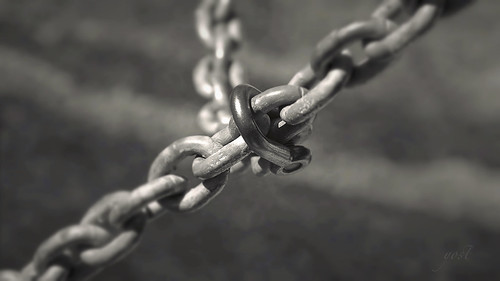
Chain black&white by yostD7000
Attribution-NonCommercial-ShareAlike License
A few things from my Pinboard bookmarks from the last week.
- James G’s Stories – James and the minecraft adventure Despite being in the summer holiday James (p3 going on primary 4) is updating his story on his wiki. Independent personal learning.
- Browser Screenshots for Quick Testing – 300+ Real Browsers, Internet Explorer 6-10, Local Testing, API, Resolution Options. This is a useful site for seeing how webpages look in browsers and operationg systems that you do not have to hand.
- Want to issue open badges? Here are some options. We have been thinking and talking about Badges and OpenBadges a lot on the glow project recently, this looks like a good list of options.
- BBC News – How did Lego become a gender battleground? Lego introduces female scientists. A related link from my enviable stuff tumblr.
- Tips & Tricks for Recording Audio Narration reding this in prep for the new season of EDUtalk.
- For Your Processing – Welcome to p5.js I did a fair bit of the FutureLearn processing course this looks like an interesting thing to play with in JavaScript, this gif is one from processing.
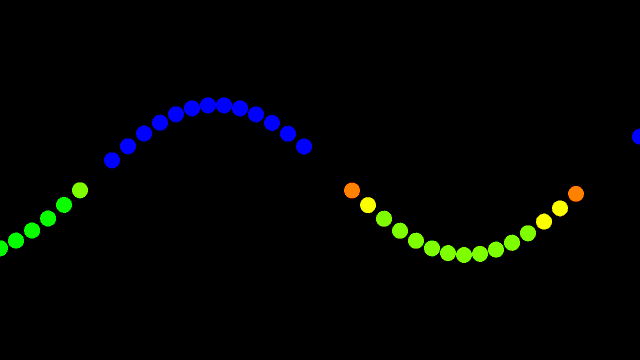
- Terms of Service; Didn’t Read
We are a user rights initiative to rate and label website terms & privacy policies, from very good Class A to very bad Class E.
Terms of service are often too long to read, but it’s important to understand what’s in them. Your rights online depend on them. We hope that our ratings can help you get informed abour your rights.
- Beginning to process the LA Reclaim Your Domain Hackathon | Abject There is a nice podcast explaining APIs and why they are important in this blog post.
- Gif Boy Some silly fun that wiled away a commute or two.

